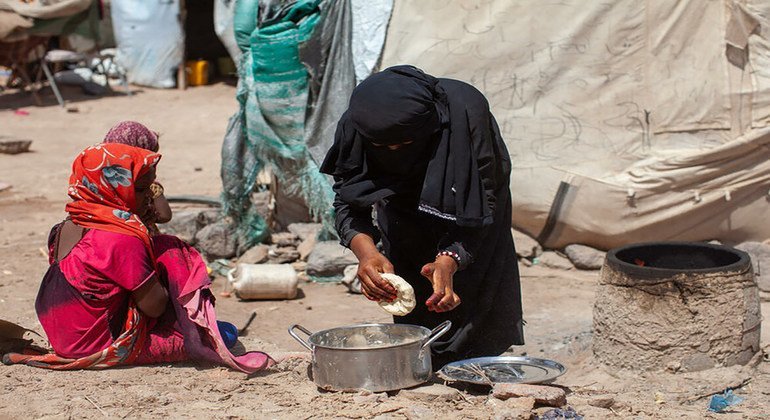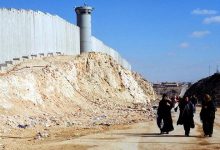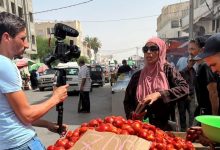Huge needs linger in Yemen as peace teeters on the brink, UN relief deputy warns
 The UN’s deputy relief chief Joyce Msuya stressed on Sunday that life-saving humanitarian assistance and protection in Yemen must be ramped up to protect the lives of millions of vulnerable people across the war-ravaged country.
The UN’s deputy relief chief Joyce Msuya stressed on Sunday that life-saving humanitarian assistance and protection in Yemen must be ramped up to protect the lives of millions of vulnerable people across the war-ravaged country.
Some 23.4 million people in Yemen – more than two-thirds of the entire population – need humanitarian aid, said the deputy Emergency Relief Coordinator, wrapping up a nine day fact finding mission, with 17 million people being food insecure.
Tweet URL
Malnutrition rates among women and children are among the highest in the world, with 1.3 million pregnant or breastfeeding women and 2.2 million children under five, needing treatment for acute malnutrition.
Truce dividend
On the heels of more than seven years of conflict, a UN-sponsored truce this April has led to a drop in civilian casualties and paved the way for much-needed fuel supplies to enter the country. The UN has called for the renewal and expansion of this truce, which so far is still holding.
“Though important progress has been made since the start of the truce, enormous humanitarian needs remain in Yemen,” said Ms. Msuya, who has been talking to different communities during her trip, seeing conditions first hand.
Aid for the long haul
“There is no doubt: without continued commitment from donors, millions of people will go hungry, and the lives of millions of malnourished children will be put at risk,” she said. “This is a critical time for Yemen and humanitarian donors cannot take their foot off the pedal.”
During her visit, Ms. Msuya visited Aden, Marib, Sana’a and Al Hodeidah. She met displaced and conflict-affected people who urgently need humanitarian assistance, as well as Yemeni officials and aid partners.
‘Extraordinarily inspiring’
“It was extraordinarily inspiring to see the work that the humanitarian community is doing here,” Ms. Msuya said. “I am deeply grateful to all humanitarian workers who are doing everything possible to help displaced people and host communities.”
In Marib, Ms. Msuya met people forced to flee their homes, and heard how they now lack food and safe drinking water, basic health services and education.
She also met displaced women and girls who spoke to her about gender-based violence, being forced into early marriage and the lack of privacy and safety. Aid agencies have provided livelihood opportunities for many of these women, who are often the main breadwinners of their families.
War ‘destroyed everything we owned’
Amal, who has been sheltering with her family in Al Sumyah site in Marib, has been uprooted four times in the past seven years. “The war destroyed our livelihood and everything we owned,” she said, emphasizing that her community requires livelihood opportunities and support for children’s education.
Tweet URL
Some 4.3 million have been displaced since the conflict in Yemen escalated in 2015. Most people who fled violence have been displaced for many years and many have been forced to move multiple times. Since April, an additional 160,000 people have also been uprooted by torrential rains and flooding across the country.
Landmine victims
In Hudaydah, Ms. Msuya visited the UN-supported Al Thawrah Hospital, where she met children and adults injured by mines and unexploded ordnance. Over the past six months, landmines and other explosive hazards have become the most common cause of conflict-related civilian deaths or injuries.
Three weeks ago, Yousef, 17, was walking to his home in the Al Mandhar area when he stepped on a landmine. He lost his left leg.
“We hope that all these mines will be cleared,” said Yousef’s brother. “We don’t want this tragedy repeated.”
The deputy chief for humanitarian affairs also visited the hospital’s malnutrition treatment ward, where she spoke with mothers of malnourished children and saw the different ways humanitarian agencies are supporting women and children.
Deadly price of poverty
Ms. Msuya also met Safie, a displaced widow in her fifties, forced to flee her home six years ago. She lost her mother, sister and brother in the same month.
“My sister died from birth-related complications because we couldn’t afford the treatment,” Safie said.
Jobs and development
“Everywhere I went, people told me they desperately wanted jobs so they could support their families, as well as access to healthcare, clean water and schools”, said the deputy relief chief. “We need development actors to step in to help authorities provide these services; humanitarians cannot do this alone.”
Ms. Msuya said the two most effective ways to reduce humanitarian need in the country, were to build a sustainable and inclusive peace, and get the decimated economy back on its feet: “Without these, the drivers of the humanitarian crisis will persist and people will continue to suffer”.
Simon Blake is an experienced journalist deeply interested in international affairs and global development. Having spent years reporting on humanitarian issues, he offers a unique perspective in his coverage of United Nations news.




Are there any specific plans in place to ensure the protection and assistance for the vulnerable populations in Yemen is being ramped up effectively?
Yes, there are ongoing efforts to increase humanitarian assistance and protection for the vulnerable populations in Yemen. The UN, along with various humanitarian organizations, is working tirelessly to ramp up support and address the urgent needs of millions of people in the war-torn country.
It is heartbreaking to see the dire situation in Yemen, with millions of people in desperate need of humanitarian aid. The international community must step up efforts to provide life-saving assistance to those suffering in this war-torn country. I commend the efforts of organizations like the UN in trying to bring relief to the vulnerable populations in Yemen.
It’s truly heartbreaking to see the dire situation in Yemen. The humanitarian aid efforts must be intensified to ensure the safety and well-being of millions in need. I hope the international community will step up their support and make a real difference in the lives of those impacted by this ongoing crisis.
It’s devastating to see such dire conditions in Yemen. Humanitarian aid must be increased to save the lives of the millions of vulnerable people there. I hope the truce holds and more support reaches those in need.
The situation in Yemen is heartbreaking. It’s crucial that international aid and support continue to flow into the country to address the urgent humanitarian needs. We must prioritize the well-being of the most vulnerable populations.
It’s heartbreaking to see the ongoing suffering in Yemen. We must continue to prioritize and escalate humanitarian efforts to provide life-saving aid to the vulnerable population. The alarming number of people in need highlights the urgency of this situation. Let’s support and amplify relief initiatives in Yemen.
How can we ensure that the much-needed humanitarian assistance in Yemen reaches all the vulnerable communities, especially considering the ongoing conflict?
Are there any specific initiatives in place to address the malnutrition rates among women and children in Yemen?